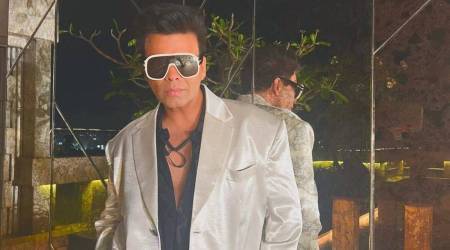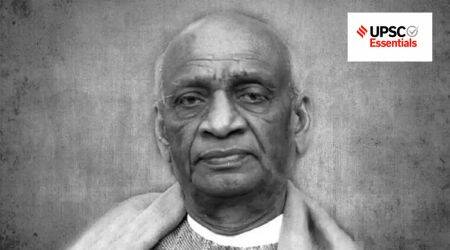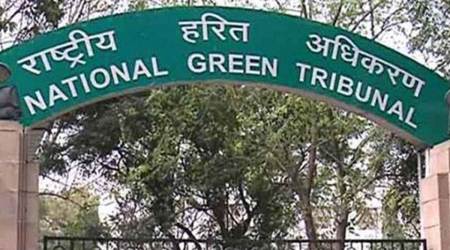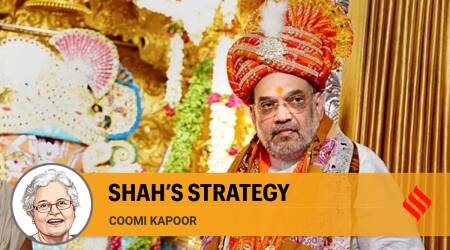Written by Andrew Higgins
Like many of the ethnic Russians who live along Estonia’s eastern border with Russia, Stanislava Larchenko could not believe that President Vladimir Putin had gone on a killing spree in Ukraine.
Larchenko, 51, got angry with her son when he said in February after Putin invaded Ukraine that Russian soldiers were killing civilians. She insisted the carnage was the work of Ukrainians dressed in Russian uniforms, a trope of the state television beamed in from Russia that she watched.
“For me, Russia was always a liberator, a country that got attacked but never attacked others,” Larchenko said in the Estonian border city of Narva, NATO’s easternmost outpost and the European Union’s most ethnically Russian city.
Best of Express Premium
 PremiumThere are no stars anymore, says Karan Johar. Why he is right
PremiumThere are no stars anymore, says Karan Johar. Why he is right
 PremiumGet inspired: Why did Sardar Patel say that civil servants must not take …
PremiumGet inspired: Why did Sardar Patel say that civil servants must not take …
 PremiumNITI Aayog-commissioned report which studied 3 orders by Supreme Court, 2…
PremiumNITI Aayog-commissioned report which studied 3 orders by Supreme Court, 2…
 PremiumInside Track: Amit Shah’s strategy for Maharashtra and FadnavisMore Premium Stories >>
PremiumInside Track: Amit Shah’s strategy for Maharashtra and FadnavisMore Premium Stories >>
But after four months of war, Larchenko said she had “taken off my rose-colored glasses” and stopped quarreling with her son, Denis, 29, after taking his advice to stop watching Russian state TV.
“Psychologically,” she said, “I have passed over to the other side.”

 Katri Raik, mayor of Narva, Estonia, June 15, 2022. Some ethnic Russians in Narva are starting to doubt the Kremlin’s official narrative about the war in Ukraine. (The New York Times)
Katri Raik, mayor of Narva, Estonia, June 15, 2022. Some ethnic Russians in Narva are starting to doubt the Kremlin’s official narrative about the war in Ukraine. (The New York Times)
In a city where nearly everyone speaks Russian instead of Estonian and faces social pressure to stick with their ethnic group, Larchenko is unusual in her willingness to state openly that she no longer sees Russia as a force for good but as an aggressor.
That so few Russians in Estonia’s free and democratic society are ready to do this is perhaps an indicator of how difficult any change of heart will be for people in Russia, where open criticism of the war is a criminal offense.
Beneath the surface, however, the mood in Narva is changing, particularly among younger ethnic Russians. For some, this shift carries a worrying message for the Kremlin: Private doubts are eroding public support for what Putin calls his “special military operation.”
Others see only lock-step loyalty ahead: Russians, said Raivo Raala, a dyspeptic ethnic Estonian retiree in Narva, “are not people, but slaves.”
Larchenko’s son, a member of the City Council, said most ethnic Russians in Narva “now know that Russia was wrong to attack Ukraine” but still struggle to reconcile this with a foundation of their identity — deep pride in Russia’s role in the defeat of Nazi Germany.
Sergey Tsvetkov, a Russian critic of the Kremlin who fled to Narva from St. Petersburg, Russia, in 2014 and now aids refugees from Ukraine, said he was disappointed that so few ethnic Russians in Estonia had spoken out against the war.
But, he added, “people are now starting to think a bit more — most have not changed their minds, but they are having doubts” about Russia’s rationale for invading Ukraine, principally its claim that Ukraine has been overrun by fascists and needs to be “liberated.”

 Stanislava Larchenko, who is ethnic Russian, said she had “taken off my rose-colored glasses” about the war in Ukraine, in Narva, Estonia, June 16, 2022. (The New York Times)
Stanislava Larchenko, who is ethnic Russian, said she had “taken off my rose-colored glasses” about the war in Ukraine, in Narva, Estonia, June 16, 2022. (The New York Times)
Putin last month helped stoke those doubts by reframing the invasion as part of a mission to “return and strengthen” territory he said had belonged “since time immemorial” to Russia. “This,” Putin said, “applies to Narva,” conquered by Peter the Great in 1704.
Narva’s mayor, Katri Raik, an ethnic Estonian historian, scoffed at Putin’s reading of history as untrue. Nobody in Narva, including native Russian speakers, more than 95% of the city’s population, she said, wants to be part of Russia.
Around 36% of the city’s 60,000 residents have Russian instead of Estonian passports, but, the mayor said, “nobody is leaving to live in Russia,” where salaries are far lower, corruption runs rampant and health care and other services are much poorer.
“Everybody here knows what life is like over there,” Raik said.
Despite this knowledge, many ethnic Russians in Estonia looked favorably on Putin when the war started.
A public opinion survey in March by Globsec, a Slovakian research group, found that 22% of Estonians — a figure roughly coinciding with the ethnic Russian population — had a positive view of Putin, down from 30% last year.
The mayor said she believed Putin’s support had since shrunk, particularly as people can no longer easily watch Russian state television after an Estonian ban on cable services carrying it.
To affirm Narva’s separation from Russia, the city recently adopted a new slogan: “Europe Starts Here.”
Even ethnic Russian politicians who had tilted toward Moscow conceded that Russia’s despotic system was not one that anybody wanted installed in Narva.
“We live in a democratic society — those who don’t want this have already left,” said Tatjana Stolfart, a member of the City Council for the Center Party, a previously pro-Russia political force. Shortly after Russia invaded Ukraine, the party abruptly cancelled its partnership agreement with Putin’s United Russia party.
In an interview, Stolfart was initially cautious about saying who was to blame for the killing in Ukraine, but then she acknowledged, “Yes, Russia is the aggressor.”

 A young Ukrainian family of four who had just crossed the Russia-Estonia border into Narva, Estonia, June 15, 2022. (The New York Times)
A young Ukrainian family of four who had just crossed the Russia-Estonia border into Narva, Estonia, June 15, 2022. (The New York Times)
The tarnishing of Russia’s image has helped rally support, even among some ethnic Russians, for the Estonian Defense League, a volunteer militia under the Ministry of Defense. Roger Vinni, an ethnic Estonian organizer of the league in Narva, said half of its 300 members in the city are ethnic Russians. “They are Estonian patriots, just like we are,” Vinni said.
Many older Russians, he added, still harbor nostalgia for the Soviet Union, but their children and grandchildren are more integrated, speak Estonian and “see themselves as part of Estonia and Europe, not the Soviet Union or Russia.”
Younger Russians in Narva have also joined efforts to help Ukrainians, many from Mariupol and other occupied towns, who fled to Estonia to escape Russian troops.
Kristina Korneitsuk, 23, a volunteer who washes bedding for a refugee hostel, said that while she blamed Russia and Ukraine for the conflict, Putin “has perhaps lost his mind a bit.”
His comments about Narva belonging to Russia, she added, should be taken seriously. “If he can attack Ukraine there is reason to think that the next step could be the Baltics,” she said.
UPSC KEY Have you seen our section dedicated to helping USPC aspirants decode daily news in the context of their exams? See Here

